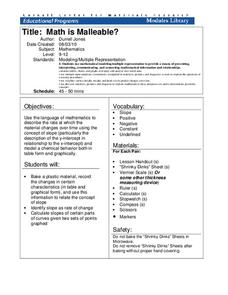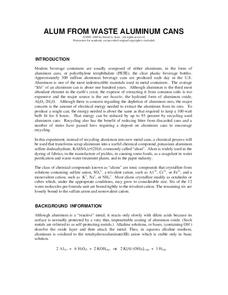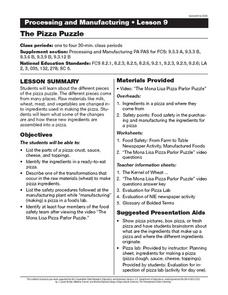Cornell University
Exploring Rocks and Minerals
Investigate the properties of rocks and minerals through a rockin' hands-on activity. Learners test rocks for various properties and, using a guide, attempt to identify different samples. They use various properties including hardness,...
Cornell University
Catapults
Ready, aim, fire! Launch to a new level of understanding as scholars build and test their own catapults. Learners explore lever design and how adjusting the fulcrum changes the outcome.
National Nanotechnology Infrastructure Network
Lines on Paper - Laser Box
See what you cannot see by getting a little creative. An intriguing lesson has learners use lasers to explore X-ray diffraction. Given a box with unknown structures, they shine a laser through the box and interpret the results....
Texas State Energy Conservation Office
Investigation: Insulation
Youngsters compare the heat-holding abilities of three different cans by insulating two with different materials and measuring the temperature change of hot water over a 20-minute period.
Cornell University
Math Is Malleable?
Learn about polymers while playing with shrinky dinks. Young scholars create a shrinky dink design, bake it, and then record the area, volume, and thickness over time. They model the data using a graph and highlight the key features of...
Pingry School
The Alchemist's Dream – Copper into "Gold"
Many scientists attempted alchemy for hundreds of years before a full understanding of metals became clear. Scholars take a penny and, through two different chemical reactions, make it appear to turn into silver and later gold. They...
American Chemical Society
Using Dissolving to Identify an Unknown
There is a solvent called aqua regis that can dissolve gold! After observing a solubility demonstration, groups receive four known crystals and one unknown. Based on the demo, they design an experiment to determine the identity of the...
Chymist
Alum from Waste Aluminum Cans
Turn aluminum cans into pickles! An engaging experiment has learners chemically change aluminum into a substance with many purposes including the manufacture of pickles. After performing the chemical conversion, the experimenters verify...
Chymist
Tritration: Standardization of a Base and Analysis of Stomach Antacid Tablets
Do antacid tablets really do what they claim? An experimental lesson attempts to answer this question. Individuals practice the process of titration during the first part of the experiment. They then use those skills to neutralize an...
Curated OER
What-Not-To-Do Laboratory
In this science and health learning exercise, students analyze a detailed drawing of "What-Not-To-Do Laboratory." Students spot the many safety hazards and color the picture.
Curated OER
Find Someone Who...
In this lab safety learning exercise, students find someone in their class who can answer five different questions about lab safety. They identify the person and write their answer on their paper.
Curated OER
The Pizza Puzzle
Students identify the origin and preparation of the main ingredients in pizza. They identify the food safety procedures followed in a pizza factory and then prepare and eat a pizza in class.
Curated OER
Hazard Symbols
In this hazard symbols learning exercise, learners are given 6 symbols commonly used in the lab for hazardous materials, agents and situations. Students look for each symbol around the classroom, on worksheets and in textbooks.
Curated OER
The Influence of Carbon Dioxide on the Chemistry of Soda
Students investigate the carbon dioxide content of different sodas. In this chemistry lesson, students explain why PET containers are preferable than HDPE for soda bottles. They collect data and graph them.
Curated OER
Making Soap
Students explore what chemical indicators are and use pH paper to determine if something is alkaline or basic. In this pH lesson students manufacture their own soap.
Curated OER
Exercise and Heartrate
Fourth graders experiment to find the effects of exercise on the heart rate. In this exercise and heart rate activity, 4th graders create questions about exercise and heart rate. Students use the scientific method to test and...
Curated OER
How Sweet It is! A Colorful Sugar Solution Density Column
Students examine the affect of density. Using a graduated cylinder and equally prepared volumes of sugar-water solutions and food color, students observe a sugar rainbow. They discover that the greater the amount of sugar in the...
Curated OER
Van de Graaff Generator
Students explore static electricity using the Van de Graaff generator. In this physics lesson plan, students construct their own Van de Graaff using simple materials. They explain how charges accumulate on this device.
Curated OER
Microbiology Lesson
Students collect water samples and use a microscope to find bacteria in the samples. They categorize the different bacteria they find, determine the number of colonies there are, and predict how the bacteria levels might affect animals...
Curated OER
Build a Tesla Coil
High schoolers explore tesla coil through various experiments. For this physics lesson, students build their own tesla coils based on a given procedure. They discuss its real world applications.
Curated OER
Ice
Students examine the different propereties of ice, such as freezing temperature. In this scientific lesson students complete several activities using ice, like making ice cream.
Curated OER
Designing an Underwater Habitat for Humans
Learners consider the limitations of deep water oceanography and design an underwater habitat to support scientists while they complete long term studies under the ocean. In this engineering lesson, students are introduced to the...
Curated OER
Change It
Fourth graders expand their knowledge about how the physical properties of a substances can be changed. They are given multiple opportunities, using first-hand experiences and familiar objects in different contexts, to identify...
Curated OER
How Strong is the Solution
Students investigate the strength of solutions. For this scientific inquiry lesson plan, students examine various solutions of food color and water as they discover the concentration of the solutions by adding bleach to clear the color.

























